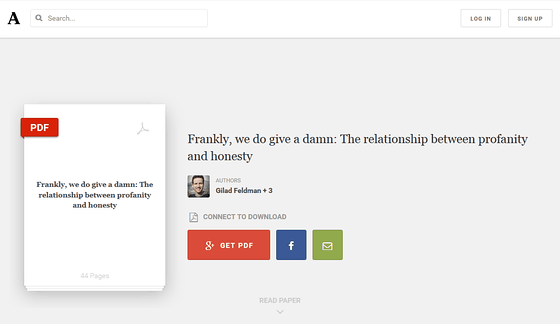2018-03-19 17:56:32
○ Frankly, we do give a damn:between profanity and honesty//「汚い言葉を使う人ほど正直者」であることが研究で判明re-up
- 17/03/24 04:27
- ♪Trump NEWS
2017-01-18 21:32:38 Academia.edu. origi.
TELLING IT LIKE IT IS
A new study linking profanity to honesty shows people who curse are more authentic


The next time someone tells you to watch your language, feel free to tell them to fuck off.
Sure, swearing is considered poor form in certain settings—like courts, classrooms, and most offices. But people who do it may be more trustworthy, according to a new three-part study analyzing swearing and straightforwardness in individuals and society.
“The consistent findings across the studies suggest that the positive relation between profanity and honesty is robust, and that the relationship found at the individual level indeed translates to the society level,” concludes the final paper, set to be published in the journal of Psychological and Personality Science this year.
Gilad Feldman of the Department of Work and Psychology in Maastricht University in the Netherlands led an international research team whose goal was to resolve a conflict in social science, which is split on the matter of swearing and straightforwardness. On the one hand, using profanity is taboo and people who do so may be more inclined to break other social norms, including committing crimes of dishonesty—and so swearing has been associated with moral turpitude, the paper explains. On the other hand, blurting curses is positively associated with authenticity in certain situations—for example, people accused of crimes who are actually innocent are more inclined to swear during interrogations than those who are guilty and denying their crime, other studies have found.
In an effort to settle the debate, the researchers first studied individual profanity by asking 276 individuals to report how commonly they curse, list their favorite swear words, and explain what emotions they associate with swearing (like anger, embarrassment, or anxiety). Then, these individuals were asked about their honesty in a rather roundabout way—they were surveyed about their reliability, among other things, using a version of the Eysenck Personality Questionnaire, a standard psychological model developed in 1985. Those who made certain claims—for example that they always do whatever they said they would—were deemed liars based on this particular scale
Next, they analyzed about 70,000 social media interactions between international participants, assessing the presence of profanity in status updates against other measurements of honesty online, such as frequency of use of words like “I ” or “me” which have been associated in previous studies with lack of forthrightness. “Profanity and honesty were found to be significantly and positively correlated, indicating that those who used more profanity were more honest in their Facebook status updates,” the researchers write.
In Connecticut and New Jersey, individuals swore frequently but their states also scored highest on the integrity analysis. Finally, the team analyzed profanity on a societal level. To do this, they looked at the 2012 Integrity Analyses of 48 US states (a measure of transparency and accountability in state governments conducted by the Center for Public Integrity). They took the state data and compared it to individual swearing scores of state residents in their Facebook study (29,701 participants), finding a correlation between frequent cursing in residents and the state’s integrity score. For example, in Connecticut and New Jersey, individuals swore frequently but their states also scored highest on the integrity analysis. Meanwhile, in South Carolina individuals politely avoided profanity, but the state also scored low in governmental integrity and openness.
“We set out to provide an empirical answer to competing views regarding the relationship between profanity and honesty,” the researchers write. “In three studies, at both the individual and society level, we found that a higher rate of profanity use was associated with more honesty.”
That said, they caution against now assuming that the potty-mouthed are all-round angels. Dishonesty in the study was limited to “conscious creation of a false sense of reality” but didn’t address true ethics. So, people who curse like sailors may still commit serious ethical crimes—but they won’t pretend all’s well online.
2017-01-18 21:32:38 Academia.edu. origi.
2017年01月13日 20時00分00秒
「汚い言葉を使う人ほど正直者」であることが研究で判明
By Morgan悪口やののしりなどの「汚い言葉」を使うのは一般的にタブーとされていますが、「口の悪い人ほど根が正直」であるという研究結果が発表されました。Frankly, we do give a damn: The relationship between profanity and honesty
| Gilad Feldman - Academia.eduhttp://www.academia.edu/29725191/Frankly_we_do_give_a_damn_The_relationship_between_profanity_and_honesty
A new study linking profanity to honesty shows people who curse are more authentic — Quartzhttps://qz.com/881289/a-new-study-linking-profanity-to-honesty-shows-people-who-curse-are-more-authentic/一般的に汚い言葉を使う人は社会規範を破りやすい傾向にあり、誰かをののしることは不道徳な行為と考えられています。一方で、無実の罪で逮捕された人は、罪を犯した自覚を持つ人より、取り調べの際に汚い言葉を使う傾向にあることも過去の研究で示されています。そこで、マーストリヒト大学心理学部のジラド・フェルドマン氏率いる国際研究チームは、「汚い言葉」と「率直さ」の関係性を、個人および社会レベルで分析するべく3つの研究を行ないました。
By Neil Girling1つ目の研究は個人レベルの汚い言葉の分析が目的で、276人の男女に「一般的に人は悪い言葉を使っている」という事実を伝えた上で、「人気の汚い言葉リスト」から、それぞれの汚い言葉から連想する怒り・恥などの感情を答えてもらいました。その後、被験者に1985年に発案された「アイゼンク性格検査(EPQ)」を受けてもらい、汚い言葉に対して話したことの信頼性が調査されました。EPQの結果により、一部の人間がうそをついていることがわかるとのこと。2つ目の研究は世界中から集めた7万人の被験者を集め、Facebookの更新内容から汚い言葉の使用頻度を割り出し、抽出された内容はオンラインユーザーの正直度を計測する「Linguistic Inquiry and Word Count(LIWC)」という分析にかけられました。この2つの研究はいずれも、「汚い言葉を使う人の方が正直である」という結果を残しており、研究チームは「特にFacebookでは、より多くの汚い言葉を使う人の方が、より正直な人であることを示していました」と話しています。3つ目の研究では社会レベルの傾向を調べるため、アメリカの48の州で2012年にセンター・フォー・パブリック・インテグリティによって公的に行なわれた「Integrity Analyses(誠実性分析)」のデータが使われました。また、2万9701人のFacebookユーザーを集めて「汚い言葉がよく使われる州」と「汚い言葉をあまり使わない州」が調べられ、2つのデータを比較した結果、汚い言葉をよく使う州ほど、誠実性分析の点数も高いという相関が見られたとのこと。研究チームは「3つの研究により、個人および社会レベルで汚い言葉の使用頻度に比例して正直度が高くなることがわかりました」と話しています。一方でこの件を取り上げたQuartzは「この研究は倫理的な部分は追求しておらず、口の悪い人が罪を犯さないというわけではない」と警告しています。なお、この研究結果は学術誌・Social Psychological and Personality Scienceで発表される予定です。






















